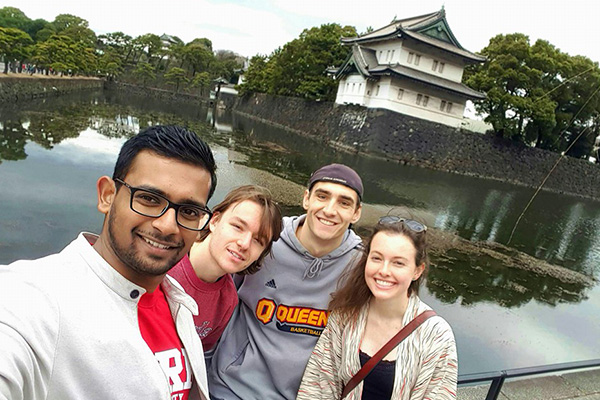Japan trip an intensive cross-cultural exchange
March 29, 2016
Share
Two important factors attracted engineering students John Lenz and Victoria Clark to the annual Japan-Canada Student Forum (JACAC): the theme of the week-long event, “Energy and Society,” and the fact that it was being held in Japan.

“I felt passionate about the topic,” says Mr. Lenz (Sc’16), who studies electrical and computer engineering, and has worked in the nuclear industry. “I thought I could share some of my experiences in the energy sector. And I’d never been to Japan, and wanted to have that opportunity.”
Ms. Clark echoes those sentiments. She’s worked in the oil and gas industry, and while her family has lived all over the world (Brunei, Syria, the United States, Oman and Canada), she had never travelled to Japan.
“There was definitely a feeling of culture shock when we arrived, especially when we travelled to Tokyo, but everyone was so welcoming, and the forum itself was very well organized,” says Ms. Clark (Sc’17), a third-year chemical engineering student.
The JACAC was held in February in Nagoya, the capital of Japan’s Aichi Prefecture. The forum, which is hosted alternately in Japan and Canada every year, brings together students from member institutions in the two countries for a week of cross-cultural exchange (this year, 28 students from 20 schools). The aim is to provide students with the opportunity to interact with their peers from a different culture, to gain insight into their current areas of academic interest, and to encourage a flow of ideas between Canada and Japan.
“It was interesting to hear the different perspectives – because of the Fukushima disaster in 2011, there is, understandably, no support for nuclear energy in Japan, and all of their reactors are shutting down,” says Mr. Lenz. “I think I was able to shed some light on working at a successful nuclear power plant (Darlington), and the focus on safety.”
Students heard presentations on topics such as energy efficiency and quality of life, and the oil era and its implications for international politics. They also went on several field trips – to Satoyama-Sugenosato, a rural village developed around principles of conservation, biodiversity and efficiency, and to the Toyota Museum of Industry and Technology.

Throughout the week, students worked in groups to improve an existing energy policy, or design a new one. The work culminated in each group giving a presentation at the Canadian Embassy in Tokyo, with several notables in attendance, including Princess Takamado and Ambassador Mackenzie Clugston (MPA’77), a Queen’s alumnus. The Princess is the widow of Prince Takamado, a member of the Japanese royal family who studied at Queen’s from 1978-81. He died in 2002 at the age of 47. Each year Queen’s welcomes an undergraduate student from Japan on a one-year term of study through a scholarship that bears his name.
“It was an incredible experience to present the work we did at the embassy. We put a lot of work into our presentations, and it was great to see it all come together at the end of the week,” says Ms. Clark. “Coming home and giving presentations in engineering classes seems like nothing now that we’ve presented to Princess Takamado and the ambassador!”
This opportunity is available to Queen’s students due to the university’s membership in the Japan-Canada Academic Consortium (JACAC). More information